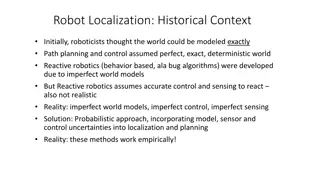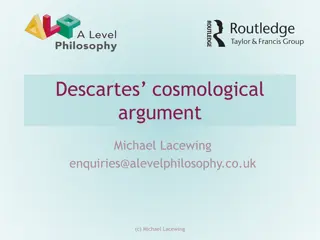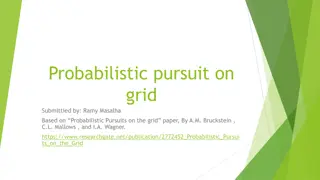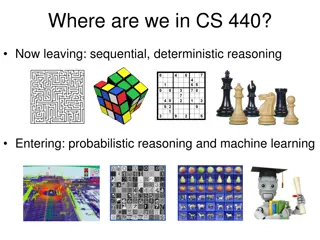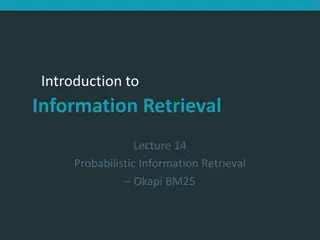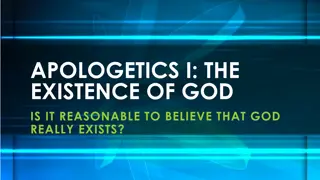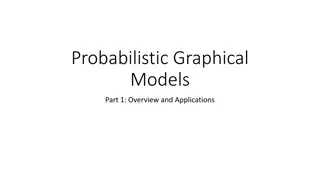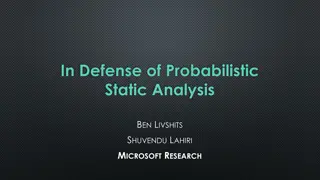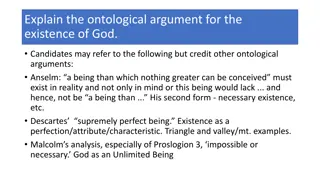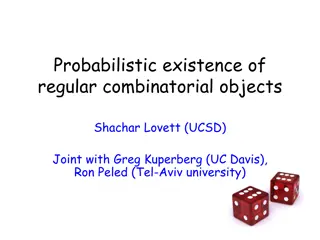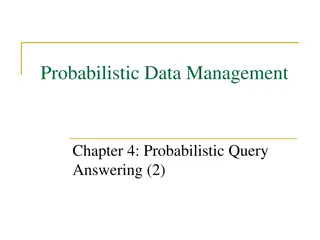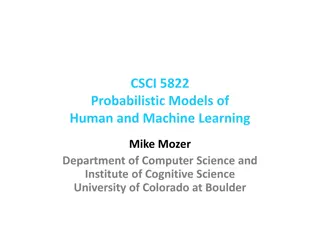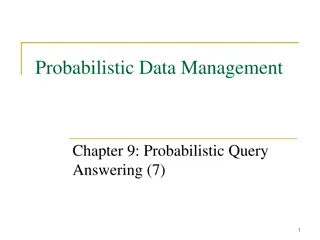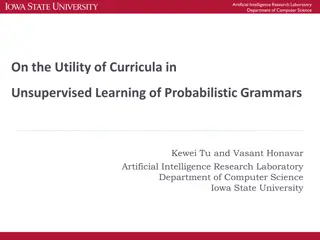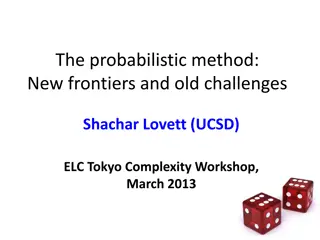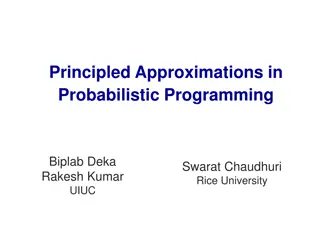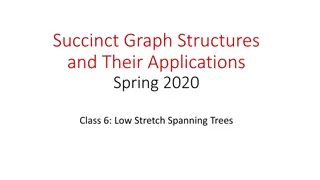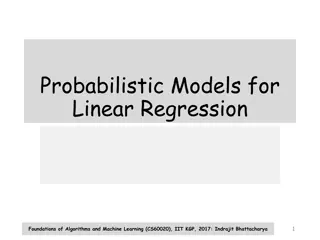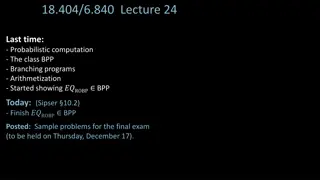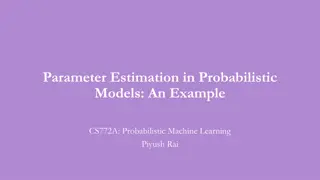The Semantic Argument for the Existence of God - International Conference Insights
Explore the Semantic Argument and its implications for the existence of God as presented by Emanuel Rutten at the International Proofs of God's Existence Conference. The lecture delves into universal properties, formal versus non-formal properties, and the likelihood of God's existence based on thes
6 views • 14 slides
Evolution of Robot Localization: From Deterministic to Probabilistic Approaches
Roboticists initially aimed for precise world modeling leading to perfect path planning and control concepts. However, imperfections in world models, control, and sensing called for a shift towards probabilistic methods in robot localization. This evolution from reactive to probabilistic robotics ha
6 views • 36 slides
Probabilistic Approach for Solving Burnup Problems in Nuclear Transmutations
This study presents a probabilistic approach for solving burnup problems in nuclear transmutations, offering a new method free from the challenges of traditional approaches. It includes an introduction to burnup equations, outlines of the methodology, and the probabilistic method's mathematical form
9 views • 21 slides
Descartes' Cosmological Argument and Existence Inquiry
Descartes presents a cosmological argument questioning the existence of anything, focusing on what causes his own existence. He explores different aspects such as perfection, dependency, and the idea of God as a necessary cause for existence. Challenges about the nature of continued existence are al
5 views • 17 slides
An Examination of Ontological Arguments for God's Necessary Existence
Various ontological arguments, such as Malcolm's and Anselm's, propose that the existence of God is logically necessary, grounded in the concept of God as the greatest possible being. These arguments challenge the coherence of the concept of God and counter objections, like Kant's claim that existen
6 views • 10 slides
Reflections on Death and Existence: A Philosophical Perspective
Philosophers have long debated the concept of death, considering it as a propitious misfortune or an inevitable end that deprives individuals of future experiences. Whether viewed as a divine decree or a statistical marvel, the existence of human life adds complexity to the evaluation of death's inh
4 views • 16 slides
Probabilistic Pursuit on Grid: Convergence and Shortest Paths Analysis
Probabilistic pursuit on a grid involves agents moving towards a target in a probabilistic manner. The system converges quickly to find the shortest path on the grid from the starting point to the target. The analysis involves proving that agents will follow monotonic paths, leading to efficient con
2 views • 19 slides
The Theory of Beauty and Criteria for Existence
Understanding the criteria for the existence of beauty encompasses different philosophical perspectives such as Materialism, Idealism, and Dualism. Materialism posits that everything is composed of material, while Idealism asserts that reality is fundamentally mental or immaterial. The debate on the
6 views • 47 slides
Introduction to Probabilistic Reasoning and Machine Learning in CS440
Transitioning from sequential, deterministic reasoning, CS440 now delves into probabilistic reasoning and machine learning. The course covers key concepts in probability, motivates the use of probability in decision making under uncertainty, and discusses planning scenarios with probabilistic elemen
1 views • 42 slides
Probabilistic Information Retrieval: Okapi BM25 Model
Probabilistic Information Retrieval plays a critical role in understanding user needs and matching them with relevant documents. This introduction explores the significance of using probabilities in Information Retrieval, focusing on topics such as classical probabilistic retrieval models, Okapi BM2
2 views • 27 slides
The Reasonable Belief in the Existence of God – Apologetics Explained
Apologetics delves into logically defending the existence of God against critics. It explores various methods of proving God's existence, including science, philosophy, personal experience, and legal/historical approaches. The concept of defining God as supernatural, intelligent, personal, and purpo
6 views • 27 slides
Probabilistic Graphical Models in Real-world Applications
Probabilistic Graphical Models (PGMs) offer a powerful framework for modeling real-world uncertainties and complexities using probability distributions. By incorporating graph theory and probability theory, PGMs allow flexible representation of large sets of random variables with intricate relations
6 views • 30 slides
Benefits of Probabilistic Static Analysis for Improving Program Analysis
Probabilistic static analysis offers a novel approach to enhancing the accuracy and usefulness of program analysis results. By introducing probabilistic treatment in static analysis, uncertainties and imprecisions can be addressed, leading to more interpretable and actionable outcomes. This methodol
5 views • 11 slides
Ontological Argument for God's Existence and Challenges
The ontological argument posits that a being than which nothing greater can be conceived must exist in reality, not just in the mind. Critics challenge this argument, citing issues with defining God and debating whether existence can be a characteristic. Gaunilo and Kant present criticisms focusing
3 views • 30 slides
Probabilistic Existence of Regular Combinatorial Objects
Shachar Lovett from UCSD, along with Greg Kuperberg from UC Davis, and Ron Peled from Tel-Aviv University, explore the probabilistic existence of regular combinatorial objects like regular graphs, hyper-graphs, and k-wise permutations. They introduce novel probabilistic approaches to prove the exist
3 views • 46 slides
Probabilistic Weather Information in Aircraft Safety Recommendations
Subcommittee on Aircraft Safety (SAS) emphasizes the importance of understanding probabilistic weather information for better operational decisions in aviation. Recommendations include leveraging existing knowledge and conducting studies to improve user understanding and decision-making processes re
3 views • 12 slides
Probabilistic Query Answering and Group Nearest Neighbor Queries
This chapter delves into probabilistic query types, focusing on probabilistic group nearest neighbor queries. Explore the definitions, processing techniques, and applications of such queries. Learn how probabilistic data management plays a crucial role in uncertain databases, spatial queries, and mo
2 views • 34 slides
CSCI 5822 Probabilistic Models of Human and Machine Learning
This content delves into probabilistic models of human and machine learning, covering topics such as Hidden Markov Models, Room Wandering, Observations, and The Occasionally Corrupt Casino. It explores how observations over time impact hidden unobserved states, formalizing problems, and understandin
3 views • 28 slides
Probabilistic Data Management
In this chapter, explore various types of probabilistic queries, focusing on correlations in uncertain data and sensor networks. Learn about representing and querying correlated tuples in probabilistic databases through examples and graphical models.
0 views • 42 slides
Unsupervised Learning of Probabilistic Grammars
In the Artificial Intelligence Research Laboratory at Iowa State University, researchers study the utility of curricula in unsupervised learning of probabilistic grammars. They explore grammar learning with a curriculum, the incremental construction hypothesis, and provide theoretical analysis suppo
1 views • 29 slides
Probabilistic Database Model
This research explores the development of a temporal-probabilistic database model to handle uncertain temporal facts obtained from information extraction methods. Motivated by the need for scalable query engines and a lack of unified approaches supporting both time and probability aspects, the study
3 views • 21 slides
Probabilistic Method: New Frontiers and Old Challenges
This content delves into the probabilistic method, highlighting its significance in tackling new frontiers and overcoming old challenges. Shachar Lovett, from UCSD, shares insights at the ELC Tokyo Complexity Workshop in March 2013, shedding light on advancements and persistent obstacles in this are
3 views • 52 slides
Probabilistic Annotation Framework: Knowledge Assembly at Scale with Semantic and Probabilistic Techniques
This content discusses the development of a probabilistic annotation framework for knowledge assembly at scale using semantic and probabilistic techniques. It also touches upon the Big Mechanism research program aiming to integrate cancer research papers into a big cancer model to frame new hypothes
2 views • 22 slides
Language Models: Probabilistic Models for NLP
Formal grammars provide binary models for language, but probabilistic language models offer a more useful approach by assigning probabilities to sentences. Explore the uses of language models in speech recognition, OCR, machine translation, generation, and spelling correction. Learn about completion
20 views • 13 slides
Principled Approximations in Probabilistic Programming and Hardware Fault Tolerance
Explore the world of probabilistic programming with advancements in principled approximations. Delve into robustness to hardware faults in sampler clustering using DPMM. Discover the concept of approximating compilers and the implementation of probabilistic programs. This collection covers a range o
1 views • 12 slides
Probabilistic Reasoning in Bayes Networks
Delve into the world of probabilistic reasoning through Bayes Networks, exploring concepts like conditional independence, global and local semantics, inference, and calculation examples. Gain insights into how to factor joint distributions and make probabilistic inferences efficiently.
0 views • 9 slides
Probabilistic Automaton and Its Applications
Explore the concept of probabilistic automaton, its extensions, and how it is utilized in modeling asynchronous systems, communication protocols, and more. Learn about stochastic languages, distributions over strings, and the practical uses of probabilistic automata.
1 views • 21 slides
Neural Network Probabilistic Properties and Testing
Explore how to check probabilistic properties of neural networks using symbolic methods and sampling, discussing specifications, testing, verification, and the importance of probabilistic expressions in ensuring correctness. Discover the significance of probabilistic specifications, training process
1 views • 18 slides
Efficient Techniques for Probabilistic Query Answering
Learn about the challenges of probabilistic query answering on uncertain data and discover basic techniques to efficiently answer different types of probabilistic queries. Explore frameworks and methodologies for enhancing query accuracy and effectiveness in managing uncertain data in real-world app
0 views • 41 slides
Probabilistic Query Answering Techniques and Applications
Explore the definition and query processing methods of probabilistic query types like Probabilistic Group Nearest Neighbor Query. Learn about Group Nearest Neighbor Queries in Uncertain Databases, their applications in scenarios like selecting a restaurant, and other GNN applications in fields such
5 views • 34 slides
Descartes Ontological Argument and Perfection in Existence
Explore Descartes' ontological argument for the existence of God based on clear and distinct ideas, perfection in existence, objections by Hume, and the inseparability of God and existence. Discover how Descartes' reasoning links the concept of a supremely perfect being with necessary existence.
2 views • 8 slides
Low Stretch Spanning Trees and Probabilistic Tree Embedding
Explore the concepts of low-stretch spanning trees and probabilistic tree embedding from the class on Succinct Graph Structures and Their Applications in Spring 2020. Learn about optimizing problems on trees, probabilistic tree embedding theorems, and low diameter decomposition. Discover the applica
1 views • 27 slides
Probabilistic Formulation in Linear Regression: Foundations and Algorithms
Explore the foundational concepts of probabilistic models for linear regression, including least squares formulation, regularization techniques, and maximum likelihood estimation. Understand how regression overfit occurs and how to mitigate it using regularization methods such as Ridge and Lasso reg
0 views • 12 slides
State Estimation and Probabilistic Filtering in Robotics
Explore the concepts of state estimation, Bayesian filtering, and probabilistic approaches in robotics for estimating robot states using sensor data and actions. Discover the importance of handling uncertainty and incorporating probabilistic models in autonomous systems.
0 views • 30 slides
Probabilistic Computation, BPP, Branching Programs Review
Delve into the world of probabilistic computation, exploring Probabilistic Turing Machines, the class BPP, branching programs, and arithmetization. Learn about the intricacies of BPP and how arithmetization is used to define operations in branching programs.
0 views • 12 slides
Probabilistic Query Answering in Data Management
Explore the definitions of various probabilistic query types and the representation and querying of correlated tuples in probabilistic databases. This chapter delves into the realm of uncertain and imprecise data, focusing on correlations and functional dependencies commonly found in sensor networks
0 views • 42 slides
Parameter Estimation in Probabilistic Models: An Example in Probabilistic Machine Learning
Learn about parameter estimation in probabilistic models using Maximum Likelihood Estimation (MLE) and Maximum A Posteriori (MAP) estimation techniques. Understand how to estimate the bias of a coin by analyzing sequences of coin toss outcomes and incorporating prior distributions for more reliable
3 views • 7 slides
A New Perspective on Existence and Non-Existence by Wu Tianqi
Explore the philosophical concepts of existence and non-existence through Wu Tianqi's work. Delve into the levels of existence, the distinction between being and existence, and metaphysical concepts related to non-being. Discover a unique perspective on reality and information worlds.
4 views • 7 slides
Efficient Coding Theorem via Probabilistic Representations
Explore the Efficient Coding Theorem through Probabilistic Representations and its applications in algorithms and complexity. Discover the pillars of Kolmogorov Complexity and the time-bounded version. Learn about efficiently samplable objects and their short probabilistic representations. Applicati
0 views • 7 slides
Understanding Probabilistic Complexity Classes
Explore the definitions and relationships between probabilistic complexity classes like PP, BPP, and VPP (R) along with key theorems in complexity theory. Dive into the concepts of poly-time probabilistic Turing machines and decision problems to grasp the nuances of these classes.
4 views • 44 slides

